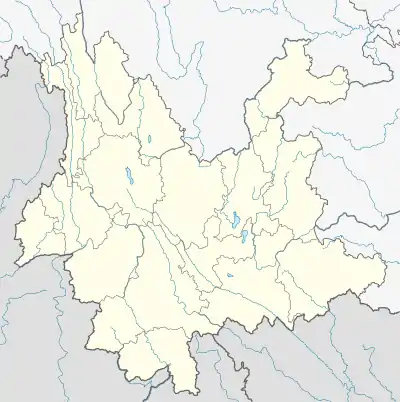Zhongxin, Huaping County
Zhongxin (simplified Chinese: 中心镇; traditional Chinese: 中心鎮; pinyin: Zhōngxīn Zhèn) is a town in Huaping County, Yunnan, China.[1][2] As of the 2017 statistics it had a population of 47,403 and an area of 326.4-square-kilometre (126.0 sq mi). It is the political, economic and cultural center of Huaping County.
Zhongxin
中心镇 | |
|---|---|
 Zhongxin Location in Yunnan. | |
| Coordinates: 26°38′00″N 101°16′12″E | |
| Country | People's Republic of China |
| Province | Yunnan |
| Prefecture-level city | Lijiang |
| County | Huaping County |
| Designated (town) | 1988 |
| Area | |
| • Total | 326.4 km2 (126.0 sq mi) |
| Elevation | 1,984.8 m (6,511.8 ft) |
| Population (2017) | |
| • Total | 47,403 |
| • Density | 150/km2 (380/sq mi) |
| Time zone | UTC+08:00 (China Standard) |
| Postal code | 674800 |
| Area code | 0888 |
Administrative division
As of 2016, the town is divided into nine villages and five communities:
- Xinglong Community (兴隆社区)
- Zhuping Community (竹屏社区)
- Liuxi Community (柳溪社区)
- Huaxing Community (华兴社区)
- Xingmin Community (兴民社区)
- Hedong (河东村)
- Hexi (河西村)
- Nanmu (楠木村)
- Suoluo (梭罗村)
- Labi (拉毕村)
- Longdong (龙洞村)
- Tianping (田坪村)
- Zuocha (左岔村)
- Maluliangzi (马路粱子村)
History
In the Song dynasty (960–1279), the Tusi government set up a government office in the region. In 1382, in the 15th year of Hongwu period of the Ming dynasty (1368–1644), a Liuguan Office (流官办事驻所) was established.[2] In 1802, in the ruling of Jiaqing Emperor of the Qing dynasty (1644–1911), the army was stationed in the region.[2]
After the establishment of the Republic of China in 1912, in came under the jurisdiction of the Centre District of Huaping County.[3] It was officially named "Huazhong" (华中镇) in 1931 and was renamed "Zhuping" (竹屏镇) in 1937.[3]
In September 1950, it belonged to the 1st District.[3] Its name was changed to "Zhongxin" (中心镇) in 1953.[3] During the Cultural Revolution, it was called "Xianfeng People's Commune" (先锋人民公社) and then "Zhongxin People's Commune" (中心人民公社).[3] In February 1983, it was renamed "Zhongxin District" (中心区).[3] It reverted to its former name of Zhongxin in March 1988, and the name has been used till the present day.[3] In August 2005, the Longdong Lisu Ethnic Township (龙洞傈僳族乡) was merged into the town.
Geography
The town is situated in the central Huaping County.[3] The highest point in the town is Mogu Mountain (蘑菇山; 'Mushroom Mountain') which stands 2,843.6 metres (9,329 ft) above sea level. The lowest point is Rongjiang (荣将), which, at 1,126 metres (3,694 ft) above sea level.
There are a number of popular mountains located immediately adjacent to the townsite which include Jiaoding Mountain (轿顶山; Baozi Rock (豹子岩), Tanshanping Mountain (炭山坪), and Longjin Mountain (龙筋山).[3]
The Liyu River (鲤鱼河), Yubi River (鱼必河) and Zuocha River (左岔河) flow through the town.[3]
Climate
The town is in the subtropical monsoon climate zone, with an average annual temperature of 19.6 °C (67.3 °F), total annual rainfall of 1,087.8-millimetre (42.83 in), a frost-free period of 303 days and annual average sunshine hours in 2486.9 hours. Spring, fall and winter are warm, while winter is relatively dry. The highest temperature is 41.8 °C (107.2 °F) (1 June 1983), and the lowest temperature is −2.1 °C (28.2 °F) (31 December 1973).
Economy
The economy of the town has a predominantly agricultural orientation, including farming and pig-breeding.[3] Significant crops include rice, wheat and corn.[3] The region also has an abundance of coastal, iron, copper, limestone, granite, graphite, kaolinite, and bauxite.[3]
Demographics
| Year | Pop. | ±% |
|---|---|---|
| 1988 | 21,956 | — |
| 1990 | 25,815 | +17.6% |
| 2000 | 34,375 | +33.2% |
| 2007 | 40,403 | +17.5% |
| 2010 | 51,866 | +28.4% |
| 2014 | 44,421 | −14.4% |
| 2017 | 47,403 | +6.7% |
| Source: [3] | ||
In 2017, the local population was 47,403. The main ethnic groups in the town are Yi, Bai, Zhuang, Dai, Miao, Lisu, Hui and Nakhi.
Tourist attractions
The Immortal Cave (仙人洞) is a famous scenic spot in the town, which is also known as a summer resort.[3]
Transportation
The town is the terminal of China National Highway 305.
The G4216 Expressway is a west–east highway in the town.
References
- Li Xiang (李享) (29 October 2020). 云南华坪县中心镇:实行“联席会议”制度 推动城市共建共治共享. dzwww.com (in Chinese). Retrieved 18 July 2021.
- He Jing & Liu Zhengfang 1997, p. 43.
- He Jing & Liu Zhengfang 1997, p. 44.
Bibliography
- He Jing; Liu Zhengfang, eds. (1997). "Administrative divisions" 行政区划. 《华坪县志》 [Annals of Huaping County] (in Chinese). Kunming, Yunnan: Yunnan Nationalities Publishing House. ISBN 7-5367-1385-1.